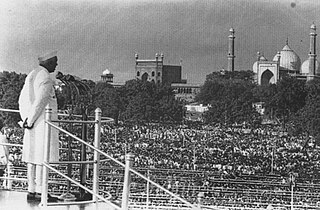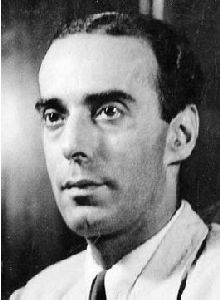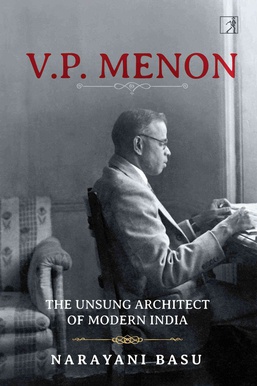
The Indian National Congress (INC), colloquially the Congress Party or simply the Congress, is a political party in India with deep roots in most regions of India. Founded on 28 December 1885, it was the first modern nationalist movement to emerge in the British Empire in Asia and Africa. From the late 19th century, and especially after 1920, under the leadership of Mahatma Gandhi, the Congress became the principal leader of the Indian independence movement. The Congress led India to independence from the United Kingdom, and significantly influenced other anti-colonial nationalist movements in the British Empire.

The Constitution of India is the supreme law of India. The document lays down the framework that demarcates fundamental political code, structure, procedures, powers, and duties of government institutions and sets out fundamental rights, directive principles, and the duties of citizens, based on the proposal suggested by M. N. Roy. It is the longest written national constitution in the world.
Events in the year 1971 in the Republic of India.

The Swatantra Party was an Indian classical liberal political party that existed from 1959 to 1974. It was founded by C. Rajagopalachari in reaction to what he felt was the Jawaharlal Nehru-dominated Indian National Congress's increasingly socialist and statist outlook.

The Constituent Assembly of India was elected to frame the Constitution of India. It was elected by the Provincial assemblies of British India following the Provincial Assembly elections held in 1946 1946 Indian provincial elections. After India's independence from the British in August 1947, its members served as the nation's 'Provisional Parliament', as well as the Constituent Assembly. It was conceived and created by V. K. Krishna Menon, who first outlined its necessity in 1933 and enshrined it as a Indian national congress demand.

Feroze Varun Gandhi is an Indian politician and a third-term Member of Parliament for Lok Sabha from the Pilibhit constituency. He is a member of the Bharatiya Janata Party and was inducted into Rajnath Singh's team in March 2012 as General Secretary. He belongs to the Nehru–Gandhi family, which has occupied a prominent place in the politics of India since a time before the country's independence in 1947.

The Sahitya Akademi, India's National Academy of Letters, is an organisation dedicated to the promotion of literature in the languages of India. Founded on 12 March 1954, it is supported by, though independent of the Indian government. Its office is located in Rabindra Bhavan near Mandi House in Delhi.

The history of independent India or history of Republic of India began when the country became an independent sovereign state within the British Commonwealth on 15 August 1947. Direct administration by the British, which began in 1858, affected a political and economic unification of the subcontinent. When British rule came to an end in 1947, the subcontinent was partitioned along religious lines into two separate countries—India, with a majority of Hindus, and Pakistan, with a majority of Muslims. Concurrently the Muslim-majority northwest and east of British India was separated into the Dominion of Pakistan, by the Partition of India. The partition led to a population transfer of more than 10 million people between India and Pakistan and the death of about one million people. Indian National Congress leader Jawaharlal Nehru became the first Prime Minister of India, but the leader most associated with the independence struggle, Mahatma Gandhi, accepted no office. The constitution adopted in 1950 made India a democratic republic with Westminster style parliamentary system of government, both at federal and state level respectively. The democracy has been sustained since then. India's sustained democratic freedoms are unique among the world's newly independent states.
Events in the year 1951 in the Republic of India.

Minocher Rustom "Minoo" Masani was an Indian politician, a leading figure of the erstwhile Swatantra Party. He was a three-time Member of Parliament, representing Gujarat's Rajkot constituency in the second, third and fourth Lok Sabha. A Parsi, he was among the founders of the Indian Liberal Group think tank that promoted classical liberalism.
The Constitution Act, 1951, enacted in 1951, made several changes to the Fundamental Rights provisions of the Indian constitution. It provided means to restrict freedom of speech and expression, validation of zamindari abolition laws, and clarified that the right to equality does not bar the enactment of laws which provide "special consideration" for weaker sections of society.

Kanhaiya Kumar is an Indian political activist who served as the president of the Jawaharlal Nehru University Students' Union and leader of the All India Students Federation (AISF). He served as National Executive Council member of Communist Party of India. He joined Indian National Congress on 28 September 2021 and has been appointed as the AICC in-charge of the National Student's Union of India.

Churchill's Secret War: The British Empire and the Ravaging of India during World War II is a book by Madhusree Mukerjee about the Bengal famine of 1943 during the period of British rule in India. It was published in August 2010 by Basic Books of New York, and later that month by Tranquebar Press of Chennai. The book examines the role in the famine, and subsequent partition of India in 1947, of Prime Minister Winston Churchill.
Ian Melville Stephens was a British journalist who was the editor of the Indian newspaper The Statesman in Kolkata, West Bengal, from 1942 to 1951. He became known for his independent reporting during British rule in India, and in particular for his decision to publish graphic photographs, in August 1943, of the Bengal famine of 1943, which claimed between 1.5 and 3 million lives. The publication of the images, along with Stephens' editorials, helped to bring the famine to an end by persuading the British government to supply adequate relief to the victims.
Youth For Equality is an Indian organisation against caste-based policies and reservations, i.e. affirmative action. It was founded by students in a number of Indian universities in 2006. It organises demonstrations and legal challenges against caste-based policies.

The Museum of Art and Photography (MAP) is a private art museum based in Bangalore, India that is a custodian to a collection of Indian art, textiles, photography, craft, and design objects spanning from the twelfth century to the present.

Gay Bombay is an LGBT social organization in Mumbai, India, which promotes LGBT rights. It was founded in 1998. The organization works to create an awareness of gay rights through workshops, film screenings, and parties. The organisation aims to create a safe space for the LGBT community.
Vishwa Nath Datta was a distinguished Indian writer, historian and professor emeritus at Kurukshetra University.

V.P. Menon: The Unsung Architect of Modern India is a non-fiction book by V. P. Menon's great-granddaughter Narayani Basu, published by Simon & Schuster India in 2020. The book is a biography of V. P. Menon, an Indian civil servant who assisted Sardar Patel in the political integration of India, and was one of the founders of Swatantra Party which advocated free market policies.

India's Struggle for Independence is a book written by historians Bipan Chandra, Mridula Mukherjee, Aditya Mukherjee, Sucheta Mahajan, and K. N. Panikkar, and published by Penguin Random House in 1987. The book examines the Indian independence movement.














